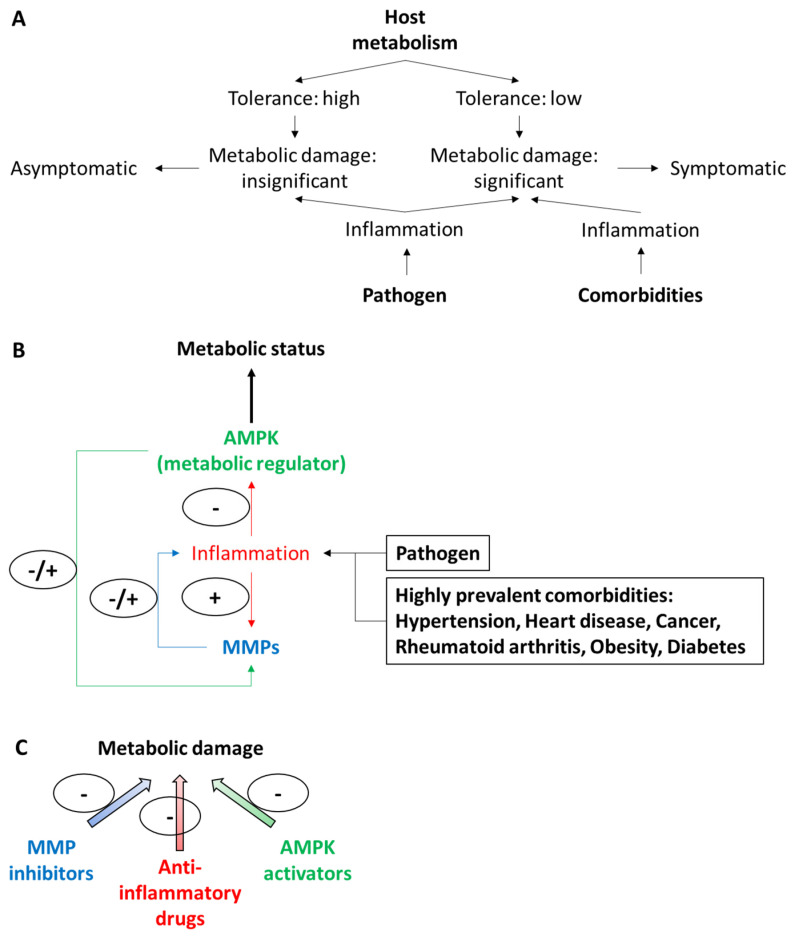Figure 1.
Representation of the proposed hypothesis. (A) Individuals can be highly or poorly tolerant to infection with new pathogens including viruses. (B) Subjects poorly tolerant to SARS-CoV-2 infection and the effects of COVID-19 tend to exhibit overproduction of proinflammatory cytokines (such as interferons α and γ, interleukins -1β, -6, -12, -18, and -33; transforming growth factor-β; and tumor necrosis factor-α) and chemokines (such as CCL2, 3, and 5 and CXCL8, 9, and 10) [12]. Excessive vascular inflammatory response with the abrupt development of the mentioned cytokine storm can cause severe pulmonary pathologies including acute respiratory distress syndrome, organ damage, and (eventually) a decrease of SARS-CoV-2-infected patients [12]. Increased levels of inflammation-regulated transcription factors (e.g., nuclear factor NF-κB and mature SREBP genes) have been strongly implicated in the development of the cytokine storm in patients (including intensive care unit and deceased subjects) with severe COVID-19 [12]. The activation of SREBP genes will exacerbate cholesterol and fatty acid biosynthesis, which could be a form of innate protection mechanism because cellular cholesterol is thought to participate in the inactivation of SARS-CoV-2 and also in the exocytosis of SARS-CoV-2. Additionally, subjects with severe COVID-19 show (i) altered the pulmonary metabolism and the metabolism of other extra-pulmonary organs and (ii) dysregulated extracellular matrix remodeling in the lung associated with the elevated cell expression, activity, and release of MMPs. SARS-CoV-2 related pulmonary pathologies (such as ALI/ARDS) are exacerbated in subjects with comorbidities associated with inflammation and metabolic anomalies [1,10,11]. (C) MMP inhibitors can increase the efficacy of AMPK activators in the setting of COVID-19. Therefore, we suggest that cocktails comprising broad-spectrum metalloproteinase inhibitors at low doses (to avoid excessive toxic effects) and AMPK activators can be used as therapeutic approaches to enhance tolerance against the metabolic damage associated with SARS-CoV-2 in symptomatic patients with COVID-19. Moreover, targeting ubiquitously expressed inflammatory transcription factors (such as NF-κB and SREBP-2) that may be upregulated in severe COVID-19 ([13] and citations therein) can be combined in this approach to hinder the cytokine storm and lung damage in corresponding SARS-CoV-2-infected patients. SARS-CoV-2: severe acute respiratory syndrome coronavirus-2; COVID: coronavirus disease; CCL: CC-chemokine ligand; CXCL: CXC-chemokine ligand; NF-κB: nuclear factor-κB; SREBP: sterol regulatory element binding protein; MMP: matrix metalloproteinase; AMPK: 5′-adenosine monophosphate AMP-activated protein kinase; ALI: acute lung injury; ARDS: acute respiratory distress syndrome.

